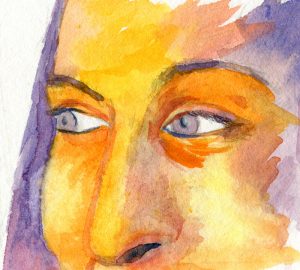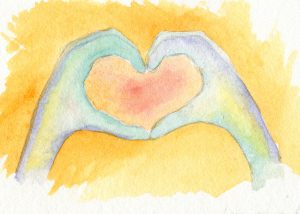
Valarie Kaur presenting the Ted Talk “3 lessons of revolutionary love in a time of rage.”
Valarie Kaur’s three practices of revolutionary love are especially significant in the formation of communities of justice. Justice doesn’t begin with the lawmakers, in the courts, the lawyer’s offices, the police precincts. It begins in our homes, workplaces, schools, faith centers, teams, clubs, and social groups. If you are looking at this site and thinking that your life is too busy to bring something to this effort, or wondering what you can do that would be effective, please read these practices carefully. You can fold them into your own life, now, today, no matter what is on your schedule. Once you’ve read them, jot down the three practices on a post it note and stick it on your desk or fridge – something that you see all the time. When you see them or think of them, review the situations or relationships you’re in right now to see if there are places where you can apply these to bring more love and more justice to your immediate interactions.
Valarie Kaur is the founder of the Revolutionary Love Project (http://www.revolutionarylove.net/). She integrates her skills as filmmaker, lawyer, and public speaker with her personal experiences of motherhood, faith, and struggles against racism and hate to share a vision for an inclusive society rooted in love. Valarie shares teachings from her Sikh faith in a way that transcends the differences between faiths. She uses motherhood to deliver a powerful message of pushing courageously through fear, pain, grief, and hopelessness to give birth to a way of life where all of our children can thrive, surrounded in love. More of her work can be also be found at https://valariekaur.com/
The description below of the three practices is adapted with permission from a transcript of her TedTalk, which can be viewed in full here: https://www.ted.com/talks/valarie_kaur_3_lessons_of_revolutionary_love_in_a_time_of_rage?language=en I have shortened the transcript to focus tightly on the practices themselves, but invite you to view the talk as well.
1. See No Stranger
 My first encounter with hate was in the schoolyard. I was a little girl growing up in California, where my family has lived and farmed for a century. When I was told that I would go to hell because I was not Christian, called a “black dog” because I was not white, I ran to my grandfather’s arms. Papa Ji dried my tears and gave me the words of Guru Nanak, the founder of the Sikh faith. “I see no stranger,” said Nanak. “I see no enemy.” My grandfather taught me that I could choose to see all the faces I meet and wonder about them. And if I wonder about them, then I will listen to their stories even when it’s hard. I will refuse to hate them even when they hate me. I will even vow to protect them when they are in harm’s way. That’s what it means to be a Sikh.
My first encounter with hate was in the schoolyard. I was a little girl growing up in California, where my family has lived and farmed for a century. When I was told that I would go to hell because I was not Christian, called a “black dog” because I was not white, I ran to my grandfather’s arms. Papa Ji dried my tears and gave me the words of Guru Nanak, the founder of the Sikh faith. “I see no stranger,” said Nanak. “I see no enemy.” My grandfather taught me that I could choose to see all the faces I meet and wonder about them. And if I wonder about them, then I will listen to their stories even when it’s hard. I will refuse to hate them even when they hate me. I will even vow to protect them when they are in harm’s way. That’s what it means to be a Sikh.
Fast-forward, I’m 20 years old, watching the Twin Towers fall, the horror stuck in my throat, and then a face flashes on the screen: a brown man with a turban and beard, and I realize that our nation’s new enemy looks like my grandfather. And these turbans meant to represent our commitment to serve cast us as terrorists. And Sikhs became targets of hate, alongside our Muslim brothers and sisters. The first person killed in a hate crime after September 11 was a Sikh man, standing in front of his gas station in Arizona. Balbir Singh Sodhi was a family friend I called “uncle,” murdered by a man who called himself “patriot.” He is the first of many to have been killed, but his story, our stories, barely made the evening news. I didn’t know what to do, but I had a camera, I faced the fire. I went to his widow, Joginder Kaur. I wept with her, and I asked her, “What would you like to tell the people of America?” I was expecting blame. But she looked at me and said, “Tell them, ‘Thank you.’ 3,000 Americans came to my husband’s memorial. They did not know me, but they wept with me. Tell them, ‘Thank you.'” Thousands of people showed up, because unlike national news, the local media told Balbir Uncle’s story. Stories can create the wonder that turns strangers into sisters and brothers.
This was my first lesson in revolutionary love — that stories can help us see no stranger.
2. Tend to the Wound of the Other
My son has been born in a time when hate crimes against our communities are at the highest they have been since 9/11. There will be moments when I cannot protect him -when he is seen as a terrorist, just as black people in America are still seen as criminal, brown people, illegal, queer and trans people, immoral, indigenous people, savage, women and girls as property. When they fail to see our bodies as some mother’s child, it becomes easier to ban us, detain us, deport us, imprison us, and sacrifice us for the illusion of security.
I returned to the gas station where Balbir Singh Sodhi was killed 15 years to the day. I set down a candle in the spot where he bled to death. His brother, Rana, turned to me and said, “Nothing has changed.” And I asked, “Who have we not yet tried to love?”
We decided to call the murderer in prison. The phone rang. My heart was beating in my ears. I heard the voice of Frank Roque, a man who once said … “I’m going to go out and shoot some towel heads. We should kill their children, too.”
On the phone, Frank said, “I’m sorry for what happened, but I’m also sorry for all the people killed on 9/11.” He failed to take responsibility. I became angry to protect Rana, but Rana was still wondering about Frank, listening. He responded,
“Frank, this is the first time I’m hearing you say that you feel sorry.”
Frank said, “Yes. I am sorry for what I did to your brother. One day when I go to heaven to be judged by God, I will ask to see your brother. And I will hug him. And I will ask him for forgiveness.”
Rana said, “We already forgave you.”
Forgiveness is not forgetting. Forgiveness is freedom from hate. Because when we are free from hate, we see the ones who hurt us not as monsters, but as people who themselves are wounded, who themselves feel threatened, who don’t know what else to do with their insecurity but to hurt us, to pull the trigger, or cast the vote, or pass the policy aimed at us. But if some of us begin to wonder about them, listen even to their stories, we learn that participation in oppression comes at a cost. It cuts them off from their own capacity to love.
This was my second lesson in revolutionary love. We love our opponents when we tend the wound in them. Tending to the wound is not healing them — only they can do that. Just tending to it allows us to see our opponents: the terrorist, the fanatic, the demagogue. They’ve been radicalized by cultures and policies that we together can change. I looked back on all of our campaigns, and I realized that any time we fought bad actors, we didn’t change very much. But when we chose to wield our swords and shields to battle bad systems, that’s when we saw change. I have worked on campaigns that released hundreds of people out of solitary confinement, reformed a corrupt police department, changed federal hate crimes policy. The choice to love our opponents is moral and pragmatic, and it opens up the previously unimaginable possibility of reconciliation.
3. Love ourselves
 But remember, it took 15 years to make that phone call. I had to tend to my own rage and grief first. Loving our opponents requires us to love ourselves. Gandhi, King, Mandela — they taught a lot about how to love others and opponents. They didn’t talk a lot about loving ourselves. This is a feminist intervention.
But remember, it took 15 years to make that phone call. I had to tend to my own rage and grief first. Loving our opponents requires us to love ourselves. Gandhi, King, Mandela — they taught a lot about how to love others and opponents. They didn’t talk a lot about loving ourselves. This is a feminist intervention.
Because for too long have women and women of color been told to suppress their rage, suppress their grief in the name of love and forgiveness. But when we suppress our rage, that’s when it hardens into hate directed outward, but usually directed inward. Mothering has taught me that all of our emotions are necessary. Joy is the gift of love. Grief is the price of love. Anger is the force that protects it.
This was my third lesson in revolutionary love. We love ourselves when we breathe through the fire of pain and refuse to let it harden into hate. That’s why I believe that love must be practiced in all three directions to be revolutionary. Loving just ourselves feels good, but it’s narcissism. Loving only our opponents is self-loathing. Loving only others is ineffective.
We need to practice all three forms of love.
Number one … in order to love others, see no stranger. We can train our eyes to look upon strangers on the street, on the subway, on the screen, and say in our minds, “Brother, sister, aunt, uncle.” And when we say this, what we are saying is, “You are a part of me I do not yet know. I choose to wonder about you. I will listen for your stories and pick up a sword when you are in harm’s way.”
And so, number two: in order to love our opponents, tend the wound. Can you see the wound in the ones who hurt you? Can you wonder even about them? And if this question sends panic through your body, then your most revolutionary act is to wonder, listen and respond to your own needs.
Number three: in order to love ourselves, breathe and push. When we are pushing into the fires in our bodies or the fires in the world, we need to be breathing together in order to be pushing together. How are you breathing each day? Who are you breathing with? Because … when executive orders and news of violence hits our bodies hard, it feels like dying. In those moments, my son places his hand on my cheek and says, “Dance time, mommy?” And we dance. In the darkness, we breathe and we dance. Our family becomes a pocket of revolutionary love. Our joy is an act of moral resistance. How are you protecting your joy each day? Because in joy we see even darkness with new eyes.